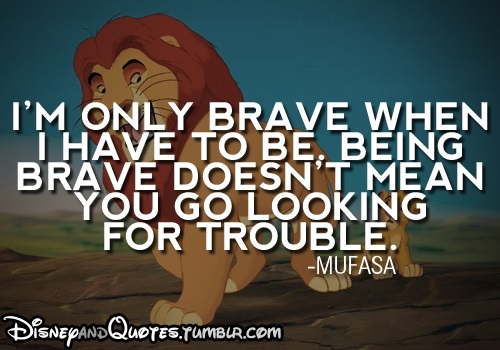 |
| Mufasa and Simba, from the cartoon "Lion King." Image text: "I'm only brave when I have to be. Being brave doesn't mean you go looking for trouble. - Mufasa." Image source. |
--------
So we've been taking Square Root to the hospital to get all his vaccines. (In China, you get all your health care at a hospital- there's no separate "doctor's office", everything is at the hospital.) Basically what happens is I hold Square Root's hands and my husband holds his legs, and the nurse gives him the shot in his leg.
Typically, Square Root is sleeping when we're there at the hospital about to get his shot, or he's awake and smiling. Then he cries for 3 seconds during the actual injection, and then we hold him and he's fine.
And so I tell him "you did so good at the doctor today." Or the nurse tells him he is 勇敢 [yǒng gǎn], brave.
And sometimes I tell people "he is such a good baby- he doesn't cry very much." In Chinese everyone says he is 乖 [guāi], which means well-behaved.
But... this doesn't feel right.
We praise him for being good, for being 乖 [guāi], but what that really means is he's not making too much trouble for us. But is that really a good thing? I want him to feel all of his emotions, to understand his own needs, to communicate about how he feels. That's far more important than whether or not he's inconveniencing me. I don't want him to think that it's "good" to hide his emotions in order to make life easier for other people.
And telling an infant that he's "brave" for tolerating the vaccine is a little silly. We literally held him down. He didn't have any other choice- and if he did have a choice, he would have chosen NOT to get poked with a needle. (He's too little to understand how important it is to not get polio.) So he didn't do anything "brave." I get that we are trying to encourage him, and to recognize that it was painful but he got through it, and put a positive spin on that... seems like "brave" isn't really the right word for that though.
I'm thinking about when I was little, and what it meant when adults told me I was "brave." Because of my undiagnosed autism, there were often situations where I felt overwhelmed, scared, or in pain- and if I just braced myself to endure through it without complaining, that meant I was "brave." I learned that it's good to pretend I don't have needs. If I communicate about my needs, if I say "I have to leave because of this and that" or "I have to avoid xyz", that's bad. I'm being a bad kid; I'm making trouble for the adults.
Here's the thing: enduring the pain of getting a shot is medically necessary and there's no way to avoid it. But a lot of the other situations where I was "brave" were not necessary at all, and it would have been much healthier if I had been able to avoid them. At the time, though, I wasn't aware that these were two different types of situations. If adults were making me do something I didn't like, well I was supposed to just put up with it. Then I was "good" and "brave." I now know that if I am experiencing negative emotions like fear or pain, I should investigate the reasons and figure out if it's actually necessary for me to put myself in that situation or not. It turns out it's not a good thing to let people hurt me when it's not necessary.
I don't want my child to think that's a good thing, like little Perfect Number did.
So I tell Square Root he is 乖 [guāi], but I also tell him he doesn't need to be 乖 [guāi]. It's okay to cry. It's okay to express emotions. It's good and healthy to tell me when he needs something.
-----------
Related:
Globophobia
"Seek First God's Kingdom" Doesn't Work If You Have Autism
Doctors (part 3 of Autism & Teaching Kids to Protect Themselves)
No comments:
Post a Comment